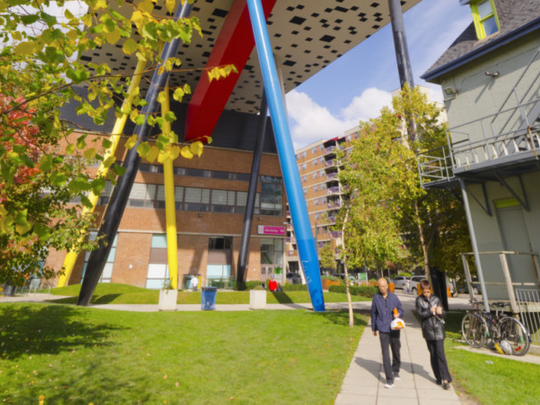
Canadian universities have a high number of students from the region, which include, according to McGill’s Executive Director and Registrar of Enrolment Services, Kathleen Massey, “expatriates from around the world who most recently lived or studied in the UAE, those who hold UAE residentship but may also be citizens or permanent residents elsewhere, and UAE nationals.” Massey says that McGill has enrolled 254 UAE students in fall 2012 to date, of which 16 per cent are graduate or postgraduate students. The majority are undergraduates.
Rachel Toyen, Coordinator, Regional Recruitment (Americas, Middle East and Africa) for the International Student Initiative at the University of British Columbia (UBC), says, “For the September 2012 intake, we had more than 180 applications from UAE students and are expecting over 30 to take up our offer and begin this fall.”
Concordia’s International Students Office puts the number of UAE students on its rolls at 28.
For students choosing their fields of study, alumni are the best endorsement for a college and provide a sneak peek into the future. GN Focus explores the best ways for students to take advantage of their Canadian education.
The right subject: “Let your first degree be a degree of passion. If you enjoy what you are doing, it will lead to your profession,” says Sajida Shroff, an alumnus of UBC’s courses on Asian area studies and history, and education. She is a Dubai-based consultant working on educational strategy, private equity investments and quality compliance.
Massey says that at McGill engineering and science are by far the most popular subjects, followed by management and programmes in the liberal arts (social sciences and humanities). At UBC too, science and engineering are popular. “However, we have students who also pursue arts, business and global resource systems,” says Toyen. At Concordia international students opt for political science, finance and engineering.
Internships and jobs: Today work experience and internships are more important than ever. “There are a number of opportunities to gain relevant work and international experiences at UBC,” says Toyen. “UBC Co-operative education is one example. Students can get paid internships during their studies in multinational corporations. Many times they end up getting hired by these same companies once they graduate from UBC.”
For some disciplines, it may be better to get some experience before you join. “I believe that unless you are mature you cannot take advantage of the programme,” says Brad Boyson, Executive Director, Society for Human Resource Management Middle East and Africa, based in Dubai, who studied Industrial Relations at UBC. “It’s sometimes better to have some experience so that you can grasp the theory.
“I would tell students to not just study for the sake of studying but get practical knowledge. I did my bachelor’s degree in my mid 20s and what I learned was immediately applicable.”
More than a degree: Going to university, for most students, is a formative experience. Shroff says that being in the university at 16 meant she grew up there. Global understanding of what the world is and how it operates, no matter what your profession, is crucial. “If you have the chance to do a liberal arts degree first, do that,” she says.
Being in Canada is an opportunity to be part of a different sociopolitical milieu. “The perspective there is different because the country is flanked by much bigger entities,” says Boyson. “It is at the crossroads of different cultures. And it is a non-threatening environment. A common political catchphrase that you hear in Canada is that it is tolerant, which is good.” .
Be open to change: A degree may lead you to your profession, but it may not be what you originally planned. Boyson, for instance, was working with trade unions, which led him to study industrial relations. “I believed that understanding the three stakeholders in the workplace, which include the management, the union and the customers, is important for understanding the dynamic. Even though there is no union environment here, my course has a direct relationship with workplace dynamics,” he says, adding that out of his class of 30 only five are in a field directly related to the course.
Shroff says that she always thought a degree in education would mean that she would end up being a professor. “As much as I was passionate about becoming an academic, I was eager to be on this side of the table and make the system better,” she says. In her current stint she works on policy and national/regional/global education strategy with government agencies, universities, school management companies and investors.
There is no such thing as too much education: “Today when it comes to professional advancement, a master’s is the equivalent of a high-school diploma,” Shroff says. Boyson shares the sentiment. Despite having a job, work experience and credentials, Boyson pursued a master’s degree because he did not want it ever to become an issue. “More education is always better than less,” he says. n







